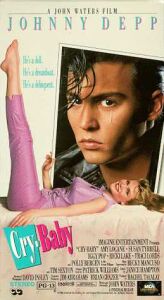Lolli's Filmseiten
Cry Baby

USA 1990, 78 min.
Crew:
Regie
Produzent
Drehbuch
Musik
Kamera
Schnitt
|
John Waters
Rachel Talalay
John Waters
David Insley
Janice Hampton
Patrick Williams
|
Darsteller:
Johnny Depp .... Cry-Baby
Amy Locane .... Allison
Susan Tyrell .... Ramona
Polly Bergen .... Mrs. Vernon-Williams
Iggy Pop .... Belvedere
Ricki Lake .... Pepper
Traci Lords .... Wanda
Kim McGuire .... Hatchet Face
Darren E. Burrows .... Milton
Mink Stole
Patty Hearst
Troy Donahue
Joe Dallesandro
Willem Dafoe
|
Bilder
Inhalt & Kritik
Eine boshafte Teenagerfilm-Satire, die es nicht leicht haben wird, ihr Publikum zu finden, denn ihr Humor wird den heutigen Teenagern vermutlich entgehen, während die Handlung wiederum zu konventionell für Kenner ist. Trotzdem ist der Film eine unterhaltsame Vergnügungsreise durch eine andere Zeit; mit verrückter Kleidung und Frisuren, forschem Dialog und einer abenteuerlich zusammengewürfelten Besetzung. Der pfiffige Soundtrack beinhält klug gemachte Originale wie auch wenig bekannte Oldie-Juwelen.
"Cry-Baby" spielt in den Geburts-Tagen des Rock'n Roll. Der Titelheld ist ein hübscher kleiner Gauner, der stets eine Träne im Auge trägt zur Erinnerung an seine auf dem elektrischen Stuhl hingerichteten Eltern. Als er sich in ein Mädchen aus besseren Kreisen verliebt und sie zu seinem Konzert "entführt", kommt es zu einer Schlägerei mit ihren Freunden, woraufhin er in einer Besserungsanstalt landet. Nach der obligatorischen Runde Jailhouse Rock kann er entfliehen, zurück zu seinem Girl und seiner Gang.
Wenn die abgeschroschene Romeo & Julia-Story erst einmal klar ist, wird die Handlung ziemlich dünn. Und der Titelheld entpuppt sich weniger als "underdog" als ein "rebel without a cause".
Variety
(...) Parodie auf Elemente des Jugendkultes der fünfziger Jahre, die in ihrer kruden Art weder zur Unterhaltung beiträgt noch heutige Jugendkultur spiegelt.
multimedia
(...) John Waters Parodie auf den Jugendfilm ist streckenweise recht witzig geraten und bietet viel Gelegenheit zu nostaligem Schwelgen. Weil aber Bezüge zur aktuellen Jugendkultur fehlen, wirkt er im ganzen doch ein wenig harmlos.
Zoom
(...) Waters, who once told inmates of Patuxent Institution, "These films I make are my crimes," has spent time behind bars lecturing to prisoners. Maybe that's why the best of "Cry-Baby" is in the lockup where Willem Dafoe attempts to hammer the values of the Eisenhower Age into his delinquent charges. And there's jailhouse rock, enthusiastically performed by the zebra-suited chorus with the sulky Depp and the sultry Locane passionately lip-syncing their tunes.
Not so much a lampoon as a celebration of cliches, "Cry-Baby" has less to say about adolescence and learning to be one's own person than 1988's "Hairspray." And some of his notions -- racial harmony among the blacks and rednecks of the period, for instance -- seem especially thin coming from the maker of "Pink Flamingos." While this is a common conceit among the makers of nerd vengeance comedies, surely Waters is capable of something a tad more original.
Basically the filmmaker reminds us of his affection for social misfits, but without much conviction. He's simply too hip to commit himself to his beliefs, and a relentless frivolity prevails. Still "Cry-Baby" is not without its spit-curled charms, its amusing lines and its funky famous-name cameos. Patty Hearst, Troy Donahue and Polly Bergen are among the has-beens featured. Like them, "Cry-Baby" wants to be so out, it's in. But even that's out these days.
Rita Kempley, Washington Post
If there is one constant in recent social history, it is that we feel nostalgia for yesterday's teenage badness even while we fear today's. As I was reading that ridiculous newsweekly cover story on rap music the other day, I found myself wishing that the hysterical old maids who wrote it could have been taken first to see "Cry-Baby," so that they could gain some insight into themselves.
In every generation, teenagers find a way to express themselves and annoy adults. And the adults find in this teenage behavior signs of the collapse of civilization as they know it. "Cry-Baby," which is a good many things (including a passable imitation of a 1950s teenage exploitation movie) is, above all, a reminder of that process. Today's teenagers will grow up to be tomorrow's adults, and yet in every generation teenagers and adults seem to have as little knowledge of that ancient fact as the caterpillar has of the butterfly.
It is an additional irony that humans have learned little from the insects, and the butterflies turn into the worms.
Roger Ebert, Chicago Sun-Times

